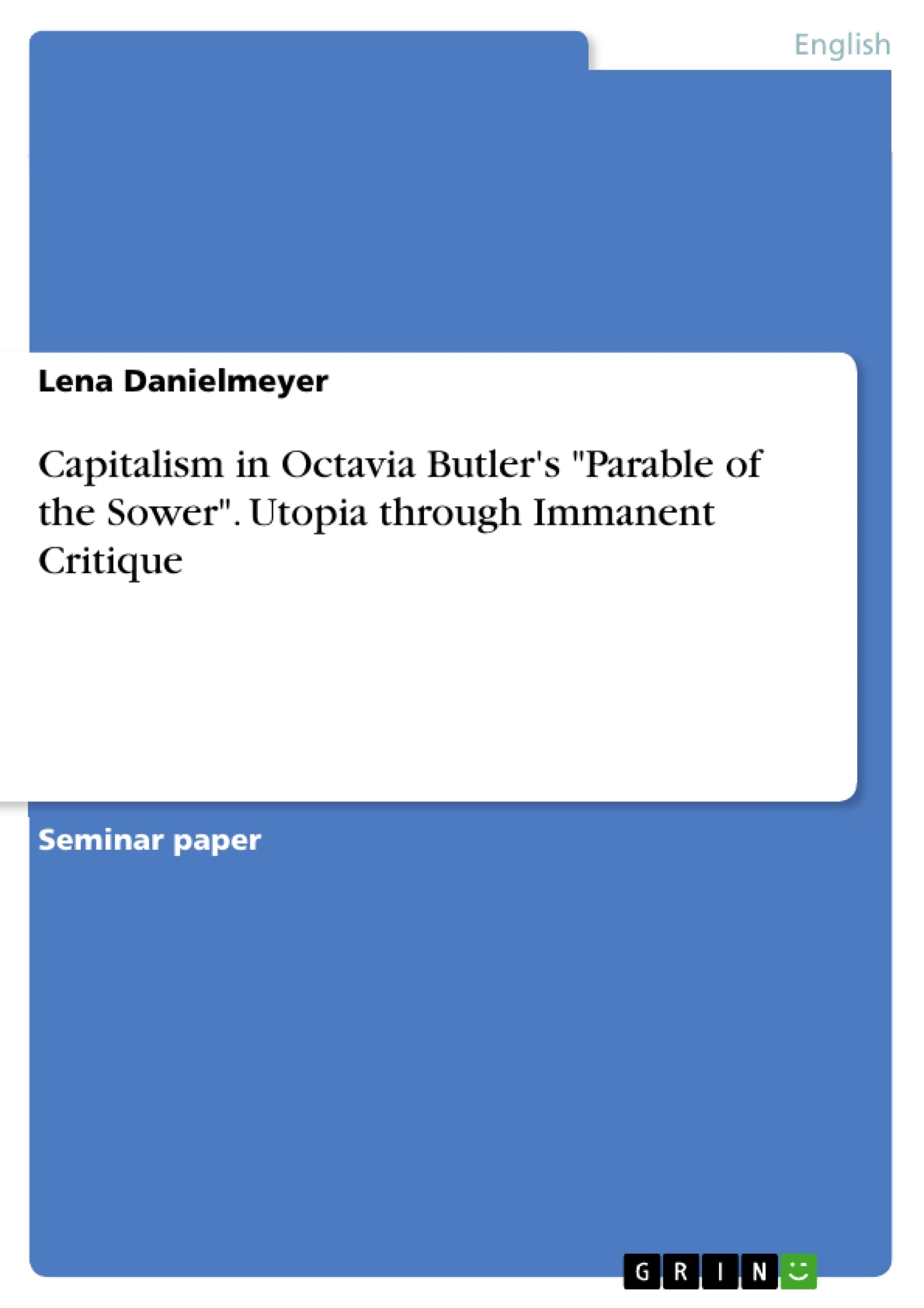This paper will argue that in "Parable of the Sower" by Octavia Butler creates utopian hope by realistically building a dystopian vision which immanently criticises the present. For reasons of brevity, this will be elucidated mainly using the example of capitalism. While an abundance of other issues taken up by the novel, like climate change, democracy, racism or violence, would certainly serve as productive foci of analysis as well, capitalism will be the centre of attention because it is at the core of the apocalyptic circumstances portrayed in the novel. It also constitutes an intersection with most of the other issues named above, making capitalism a suitable starting point.
Firstly, a short overview will be given on contemporary interpretations of the state of utopia, pointing out capitalism as a main factor in the changing of utopianism. Among others, Krishan Kumar’s “The Ends of Utopia”, Jerry Phillips’s “Utopia and Catastrophe in Octavia Butler’s Parable of the Sower” and Darko Suvin’s Metamorphoses of Science Fiction will be consulted. Realism, cognition, and estrangement will be pointed out as main tools of offering immanent critique and, in extension, utopian hope.
Secondly, the production of immanent critique in Parable of the Sower will be analysed with the help of Mathias Nilges’s paper on “The Realism of Speculation”. Mike Davis’s City of Quartz will serve to illustrate the realism in Butler’s vision of future Los Angeles. The second example will examine the company town Olivar. Briefly consulting Rottinghaus’, Pluretti’s and Sutko’s discursive paper “The End of Material Scarcity”, the effectiveness of this immanent critique will be discussed. Lastly, this paper will seek to show how immanent critique allows for the creation of utopian hope, pointing towards the transformative value of utopian literature presented in Carl Freedman’s Critical Theory and Science Fiction.
This paper will, because of its limited length, not be able to further investigate critiques of capitalism in any other context than that of Butler’s novel. Also, it will not be analysing the portrayal of capitalism as essentially nostalgic and conservative, making it the opposite of the utopian vision of adaptation and progress that it is contrasted with. This paper will not delve deeper into other interesting aspects of the generation of utopian hope, like narration
Inhaltsverzeichnis (Table of Contents)
- Introduction
- Capitalism as the end of utopia
- Parable of the Sower
- Immanent critique
- Utopian hope
- Conclusion
- Works cited
Zielsetzung und Themenschwerpunkte (Objectives and Key Themes)
This paper explores the concept of utopian hope in Octavia Butler's novel "Parable of the Sower," arguing that Butler creates this hope through an immanent critique of the present, particularly focusing on the role of capitalism in shaping a dystopian future.
- The changing nature of utopian thinking in the face of contemporary social and political realities.
- The use of immanent critique as a tool for generating utopian hope.
- The role of capitalism in exacerbating social and ecological problems, leading to a dystopian future.
- The transformative potential of utopian literature in sparking social change.
- The importance of realism and estrangement in creating effective utopian critique.
Zusammenfassung der Kapitel (Chapter Summaries)
- Introduction: This chapter introduces the concept of utopian and dystopian literature, highlighting the shift from traditional utopian blueprints to more dystopian visions in contemporary works. The paper argues that "Parable of the Sower" offers a unique approach to utopian hope through its realistic portrayal of a dystopian future and its immanent critique of capitalism.
- Capitalism as the end of utopia: This chapter explores contemporary interpretations of the state of utopia, emphasizing the influence of neoliberal structures and the perceived lack of alternatives to capitalism in undermining utopian thinking. It examines how the rise of consumerism and the "perfectionist claims of modernity" have contributed to a general sense of disillusionment with utopian ideals.
Schlüsselwörter (Keywords)
This paper examines the key themes of immanent critique, utopian hope, dystopian literature, capitalism, and social change in the context of Octavia Butler's "Parable of the Sower." It draws upon critical theories of science fiction and utopianism to analyze the novel's realistic depiction of a dystopian future and its exploration of the transformative potential of utopian literature.
Frequently Asked Questions
How does Octavia Butler create utopian hope in "Parable of the Sower"?
The author argues that Butler creates utopian hope through a realistic dystopian vision and an immanent critique of contemporary capitalism.
Why is capitalism the focus of this analysis?
Capitalism is analyzed because it is central to the apocalyptic circumstances in the novel and intersects with issues like climate change, racism, and violence.
What theoretical tools are used to analyze the novel's critique?
The paper utilizes concepts like realism, cognition, and estrangement as tools for offering immanent critique and generating utopian hope.
Which real-world examples illustrate the novel's realism?
The paper uses Mike Davis’s "City of Quartz" to illustrate the realism in Butler’s vision of future Los Angeles and examines the company town Olivar.
What is "immanent critique" in the context of this paper?
It is a method of criticizing the present from within its own structures, allowing for the transformation of dystopian realities into utopian possibilities.
How has contemporary utopianism changed according to the paper?
The paper discusses how neoliberal structures and the lack of perceived alternatives to capitalism have undermined traditional utopian thinking.
- Quote paper
- Lena Danielmeyer (Author), 2020, Capitalism in Octavia Butler's "Parable of the Sower". Utopia through Immanent Critique, Munich, GRIN Verlag, https://www.grin.com/document/925940



